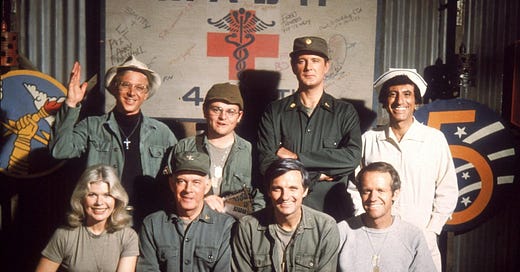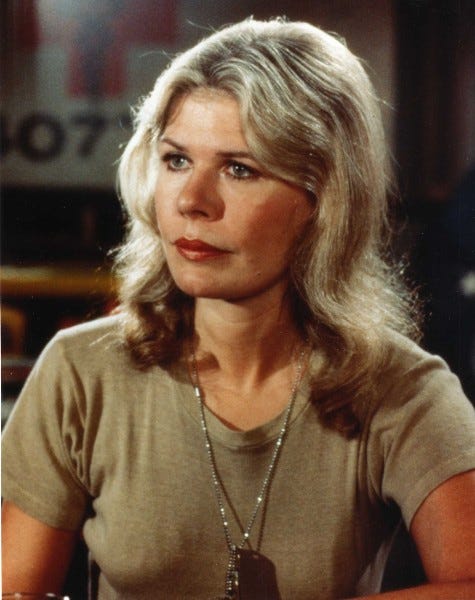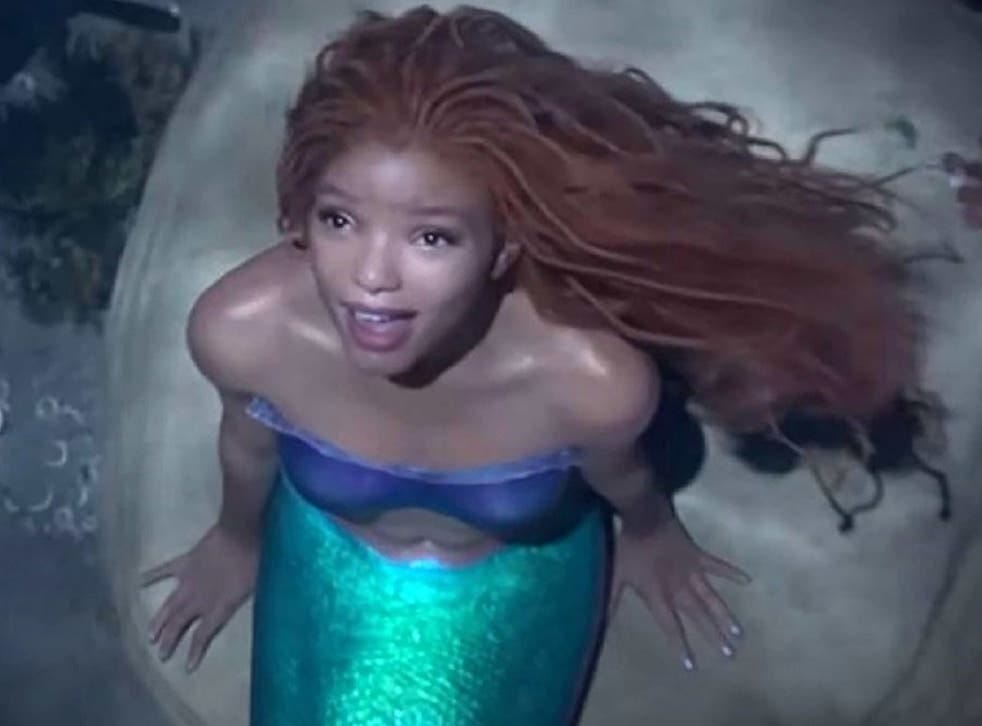M*A*S*H was very funny. And also very sexist. That is a lethal combination.
When people keep laughing at the sexism, the effect is one of embedding the sexism in the culture.
With the 70s sitcom M*A*S*H turning fifty, the accolades are everywhere. Cast reunions, marathon specials, listicles and more listicles, an Alan Alda NY Times interview are just a few of the treats currently available for fans.
What we’re not seeing, however, is a discussion of the sexism that drenched the show.
Just to be clear, I spent my teens and early adulthood laughing at the show, too. And M*A*S*H Reruns were a late-nite staple in the 90s. Of course I tuned in, like pretty much everyone. It was one of the most watched show in television history for a while, and is on lists of top shows ever.
But that’s exactly the problem. When embedded sexism becomes not only normal but entertaining, the culture reinforces the worst dynamics of oppressive sexism.
****
How is M*A*S*H sexist? Let me count the ways.
First of all, Hawkeye is a serial harasser. He hits on every woman who walks in. This was taken as part of his character, the charm that we are all supposed to enjoy and embrace. This was “who he is”.
Today, of course, we know that “this is the way he is” is one of the most commonly used lines to protect abusers. It is a classic tactic for defending abusers against complaints. (Consider how easily 30 years of “alleged” harassment by Michael Steinhardt was dismissed as “He was just a kibbitzer.”) This is very real. And it is very not funny.
Second of all, there were very few female characters with names, lines, and personalities. There were never female doctors, and the main job of the women who came and went were to be love interests, the kind who found Hawkeye’s relentless pursuit charming.
Third, and most important IMO, is the character of Head Nurse Major Margaret Houlihan. She was the only woman on the cast — a classic “Smurfette syndrome” in which writers get to claim equality by having one representative of the unrepresented group. Her presence does not make for equality. She is a token representative whose presence lets the men in charge pat themselves on the back for doing equality.
So there was one woman with a name and a character and talking parts. And what was that role? She represented the nurses, which was the exclusively women’s group, as opposed to the doctors, which was the men’s group. There was complete gender segregation in jobs, which crafted an absolute hierarchy in everything else. Men had names, complex characters, story lines, and speaking roles. Doctors are also the ones who make decisions, whose needs are met, who get to say “scalpel” while the women are the ones to give the scalpel or serve whatever else the men — doctors and soldiers — need at any given moment. Women are not expected to think, feel, or want anything other than service for the men. And of course, the men will be paid much more than the women — both the characters and the actors in real life. This is exactly what patriarchy looks like.
Most troubling to me is that Houlihan’s character experienced non-stop sexist bullying, shaming, mocking, and blocking. Actress Loretta Swit has said that she felt the story-lines were “demeaning” and after a few years eventually worked with the writers to make her character more feminist. But that was only partially successful. The trope of mocking her personality and sexual choices was endless.
Even now, with these 50-anniversary stories, the mocking of Major Houlihan is represented as an essential part of the show. Every single story about the show where she is mentioned calls her Margaret “Hot Lips” Houlihan. But “Hot Lips” was not her name or her nickname. This isn’t like Joseph “Joe” Biden or Shlomo “Cheech” Lahat or “Lady Gaga”. This was the name that she was given by the people mocking and bullying her around her sexuality. Imagine trying to do your life-saving work as a healthcare worker where everyone around you routinely calls you “Hot lips”.
In real life, women who experience the kind of workplace that she did might have quit, sued, or developed some addictions. Least likely would be that she stuck around till the end.
To be fair, the show originally aired before Anita Hill taught the county what sexual harassment was. Before Congress enacted anti-sexual-harassment laws. Before #MeToo made people pay attention to stories like these.
On the other hand, today we know and people are still full of praise for the show. Without any critical thinking about this. Not even at the NYT. The interview with Alan Alda did not even ask him whether the womanizing, bullying, sexism of his character bothered him.
And by the way, Hawkeye was supposedly a liberal character — so much so that the original author of the book that M*A*S*H was based on, complained that Hawkeye was not right-wing. (The author, who was actually a doctor in the Korean War and based the book on his own experiences, calls himself a “patriot”). This is particularly mind-numbing. When liberal-progressive men who create public reputations as feminists during the day while abusing women at night, the added pain for women and victims in general is intense. These are supposedly the “good guys”. As if. Think Eric Schneiderman, the NY District Attorney who was literally helping victims of Harvey Weinstein by prosecuting cases of sexual assault, while choking women at night. Like that. The good guys get away with this stuff for a long time because women don’t want to lose an “ally”. And they can get away with it because of the “good guy defense”. Even just recently, a guy who raped an 80-year-old woman in Israel was defended by a long list of rabbis because they all called him a “good guy” who just “made a mistake — don’t we all make mistakes?” Shit like that. As if rape is just a little mistake a guy makes.
My point is, the fact that Hawkeye is a serial harasser is one problem. The fact that he is ALSO a liberal, makes it worse. Because we are all trained to excuse him because, you know, he’s a great guy who saves lives and believes in peace and kumbaya.
****
Let’s also take a moment to consider Klinger, the guy who dressed in women’s clothing in order to get a Section 8.
I’m sure we can all imagine how the trans community likely feels about this. It casts them as, by definition, insane. So there’s that.
Today at least I think it’s safe to say that this trope would not likely make it into the script. As opposed to the trope of the charming sexist womanizer, which is still a beloved prototype.
The whole idea that a man who likes dresses is insane reinforces deeper gender stereotypes. This is a longer discussion that deserves its own post. But I’ll leave it here for now, with an invitation to follow Billy Porter.
*****
Why does this matter? Why should we care if a favorite show is also a showcase of sexism and harassment? It’s just a television show, you say?
Because life imitates art.
What does that mean? Let me break it down.
Imagine spending years or decades sitting through sexist, abusive, and oppressive situations and dismissing them as just the way the world is — or worse, not even considering that they are hurtful has the effect of normalizing them. It is the constant background noise to such an extent that the impact on women’s real lives is not even a topic of conversation. The people sitting around are enjoying it, laughing about it, celebrating it.
This is normalizing abuse. Normalizing sexist culture. Normalizing patriarchy.
Even worse is making these situations funny. Journalists who type out “Hot Lips Hoolihan” as if that’s part of the gag without giving one thought to what happens to women and girls whose sexuality is the subject of incessant public mockery are normalizing sex-based bullying. Just printing those words in the newspaper as if they are funny makes it okay to do that to another person.
When we sit around and laugh at these scenes without giving it one second thought, that creates habits that carry over into real life. It becomes the way things just are. Background noise. Normal.
*****
Consider this:
Last week, Disney dropped the trailer for a new Little Mermaid live action movie to be released in 2023 with a Black Ariel. In response, the White Internet is flipping out. Check out Devorah Blachor’s incisive parody of this phenomenon. Or Trevor Noah’s response.
Why does this matter? It’s just a Disney movie, you say?
Because if American culture is having a hard time imagining that a completely fictional and unrealistic mythical creature is non-White, how do you think that culture will react to having a non-White in other places that are usually reserved for White men — like board rooms, executive suites, governors’ mansions, or the White House?
Culture clearly socializes us into thinking about what is normal and what isn’t.
In response to the #ArielisBlack outrage, mothers of color have been posting videos of their daughters discovering that the little mermaid is Black. You can watch some of these videos here.
I found the thread mesmerizing. Watching the excitement of little Black girls to a Black little mermaid is palpable, and awakened something in me.
It's like that feeling that you have been walking around this world holding your breath, knowing that the world isn't exactly yours, that violence and vitriol directed at you is normal, that your otherness is expected and just the way things are, and you've been playing the game of consuming the culture that otherizes you and hurts you, and going through your life in that world even though it seems to ignore you or despise you or oppress you... You've been living that way and holding your breath that way for so long that you don't even realize it....
Until suddenly OH MY GOD it may be DIFFERENT! Oh wow, I may actually be able to be part of that world, have my voice, sing, even in this body and this skin..... It's like blasting open this whole reality and suddenly realizing that at can and should be different...
That's what it looks like to me when these little girls open their eyes wide and let out the huge grin and say, "She looks like me".
And I think to myself, I know that feeling so well. It is the feeling of years — decades — consuming a culture in which sexual harassment and bullying is not only normal but thought of as funny or amusing, in which the abusers are lionized as amazing characters, even liberal progressive thought leaders and pioneers, making tons of money and receiving endless honors and accolades for their work, despite all of that patriarchal noise in the background…. We’re supposed to just keep going in this world with that background noise, not bothering to notice, accepting that our culture is one that is inherently dangerous to me as a woman.
That has an impact. It’s like walking around and trying not to think about what I’m in so that I can function. It’s like not really breathing.
Culture matters.
Representation matters. Representation is exactly that — a mirror image of our world, of how we see ourselves. It matters.
####
Keep reading with a 7-day free trial
Subscribe to The Roar to keep reading this post and get 7 days of free access to the full post archives.






